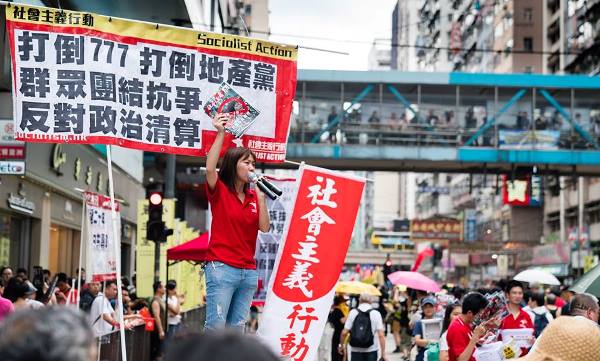The following article is the foreword to a new book from chinaworker.info on the democracy struggle in Hong Kong and China
On July 1 2017, the 20th anniversary of Hong Kong’s handover to China, Xi Jinping effectively read the riot act – warning Hong Kong’s people not to “cross a red line” in confronting Beijing. China’s control of the ‘autonomous’ region becomes more intrusive, repressive and flagrant with each passing month. China itself is experiencing the most severe crackdown on dissent for more than two decades.
This pamphlet contains some of our articles from the past few years dealing with the fight against dictatorship, against state repression, and for democratic rights in China and Hong Kong. The approach and role of Marxism in the struggle for democratic rights is of critical importance for building a mass socialist alternative to capitalism.
In Hong Kong, millions have participated in pro-democracy protests in recent years, while in China there are dozens of ‘mass incidents’ – strikes, rural revolts and anti-pollution protests – every day. Yet the Chinese regime becomes more repressive and authoritarian. How to explain this apparent contradiction and politically develop a successful fightback?
By responding to the increase in unrest with even more authoritarian measures, the Chinese dictatorship is preparing the way for new and more powerful explosions – with Hong Kong’s ‘Umbrella Revolution’ as a stark warning. Beijing’s crushing rejection of democratic concessions has created the mass phenomenon of ‘localism’ and pro-independence sentiment among Hong Kong’s youth. In Muslim-majority Xinjiang and Lamaist Tibet, Beijing’s escalation of repression has produced similar results. In Hong Kong, the past year has seen a full-scale attack on ‘localism’ through police measures as part of a wider onslaught against opposition. But while this has disorientated and demoralised the right-wing localist leaders and activists, it has only inflamed the underlying condition – that of emerging Hong Kong nationalism. The dictatorship mistakenly believes that by eliminating ‘ring leaders’, those who rode on a wave of mass anger rather than leading it, they can ‘arrest’ a social trend. While not the primary focus of this pamphlet, the national question is becoming an even more acute issue for the coming Chinese revolution.

It is hoped that this collection of material will show the development of our analysis, slogans, and political orientation, covering a period when our organisation has been plunged into several mass struggles involving up to two million people in the case of Hong Kong (the ‘Umbrella Revolution’ of 2014 and ‘Anti-brainwashing’ struggle of 2012), and the half-million-strong ‘Sunflower Movement’ in Taiwan.
The CWI has intervened as an energetic force in these movements while insuring we stand out with a distinct socialist profile, as fighters prepared to go to the end in the struggle for democratic rights. We articulate the hatred felt by workers, the youth, and the radical middle-class layers against the authoritarian regime. But we also warn against the retreats and dishonest machinations of the bourgeois democrats.
Marxists fight even for partial reforms but don’t limit ourselves to this, or blur our political differences with the liberal reformers. The pan-democratic politicians in Hong Kong (and their echoes in China) make democratic speeches but in fact desperately want a deal with the dictatorship rather than to confront it, reflecting not just an innate cowardice but also the pressure of capitalism, which has already cast its vote in favour of the dictatorship.
We have seen firsthand the dismal position of other ‘lefts’ – some who ignore these mass movements altogether, others who take part but without distinguishing themselves from the liberals. China’s ‘pan-left’, influenced by Maoist ideas and nationalism, is in general hostile to the democracy struggle. This layer has largely embraced the dictatorship’s propaganda about a “Western conspiracy to split China”. This echoes the position of the pro-tsarist reaction in pre-revolutionary Russia – who also dismissed democratic ideals as a plot to weaken Russia.
We Marxists believe China will be convulsed by new waves of democratic struggle in the future, which will split the neo-Maoist left. A section will abandon their current stand and join the struggle; others will line up on the side of chauvinist-authoritarian reaction.
Hong Kong’s mass Umbrella Movement of 2014 was a turning point, which even in defeat (we prefer to say ‘stalemate’) has profoundly changed mass consciousness and deepened hostility to the Chinese dictatorship. The new political landscape of Hong Kong, with increasing repression, places big demands on a Marxist organisation in terms of perspectives, slogans and orientation.
While others have drawn pessimistic conclusions, we have struck a balance, pointing out the constraints on the Chinese regime in its push for greater control over Hong Kong. This is partly due to Hong Kong’s instability, with a weak government, a discredited political system, and unprecedented levels of popular discontent. But it is ultimately much more about the uncertain position of the dictatorship in China itself – with economic growth stuck on an “unsustainable” path, the world’s biggest debt time bomb, and sharpening global tensions which limit its ability to export its way out of crisis as in the past.
A key task in our interventions is to dispel two important and extremely common fallacies: that capitalism and democracy are intrinsically linked, and that reform rather than revolution offers the best chance of success. In part a legacy of the Cold War, Western imperialism has for decades promoted the idea that capitalism and ‘Washington Consensus’ economics (deregulation and privatisation) is a force for democratising authoritarian and semi-authoritarian regimes, breaking up crony power relationships and subjecting formerly authoritarian elites to ‘international standards’. This confidence trick is being perpetrated right now from Burma to Ukraine. In many other countries, for example Saudi Arabia, imperialism does not bother to claim any steps towards democratic rights.

Our role is to bring international experience to bear, in societies where nationalism runs deep. The most common word used in any discussion about democracy in Hong Kong is… Hong Kong! Largely due to conscious de-politicisation by the bourgeois pan-democrats, there is unfortunately a very low level of cognisance within the democracy struggle that this is in fact part of a global process and movement, with vast experience and life-saving lessons to be found in countries from Brazil to Indonesia. Hence, the bourgeois pan-democratic leaders in Hong Kong stubbornly cling to a bankrupt strategy, for which there is not a single example of success anywhere in the world, of seeking to convince a bloodthirsty dictatorship of the value of elections!
When we globalise the perspective the problem stands out more clearly. Democratic rights are under attack across the world including in the main capitalist ‘democracies’. We have seen repressive national security and anti-terror laws rolled out in Europe and the US, accompanied by militarisation of police forces and laws to criminalise protest. This is a global trend. At the same time these anti-democratic measures meet resistance from workers’ organisations and the left. Nowhere is this clearer than in the US, where the authoritarian tendencies of ‘Trumpism’ have so far been held in check by unprecedented mass mobilisations during the president’s first months of office.
Marxists explain that throughout history democratic rights have been won through mass revolutionary struggle, in which especially since the dawn of the 20th Century the working class and its organisations have played the key role. This has been the lesson from South Africa to South Korea for example.
In contrast the bourgeois liberals promote the idea that ‘democratic’ imperialism, the US and European Union, and the so-called international community are the main agents of democratic change. The long list of current US-backed and European-backed dictators shows this is untrue. China is perhaps the clearest example of an autocratic regime that has received invaluable support from global capitalism over the past three decades.
During the rise of capitalism with the revolutions of the 18th and 19th centuries, the radical bourgeoisie mobilised the plebeian masses behind it in the struggle against absolutism and feudalism, to thus clear the way for capitalist development. This was a revolutionary struggle in which the bourgeoisie for reasons of its own quest for power raised the banner of expanded democratic rights and parliamentary government.
But as the bourgeoisie consolidated its power the actual fruits of democratisation proved more limited. In Britain – the ‘Mother of Parliaments’ – only one in eight of the adult population could vote in elections up until 1866 – after the American Civil War. And that war was a ‘supplementary’ revolutionary war waged by the American capitalists against the southern slave-owners, whose power, based on the most brutal form of exploitation, had been allowed to grow despite the founding of a ‘democratic republic’ almost a century earlier.
From history, therefore, we see that democracy and democratic rights have everywhere been the result of revolutionary struggles. With the development of imperialism, colonies, and the domination of the world economy by a handful of wealthy capitalist countries, alongside the emergence of powerful working class movements, capitalism’s role in relation to revolutionary democratic movements changed fundamentally. The emerging capitalists in the underdeveloped world were too connected to feudal interests and foreign capital to seek to challenge the existing order. As Leon Trotsky explained in his Theory of the Permanent Revolution, this task would fall to the working class and Marxism. This is also the key to understanding the ‘democratic problem’ in Hong Kong and China today.

Understanding the relationship between democratic struggle, a programme of democratic demands, and the struggle for socialism, is a key aspect of the political armoury of Marxists. Even in the advanced capitalist countries parliamentary democracy is again facing a deepening crisis and sections of the ruling class are increasingly looking to undemocratic and “technocratic” solutions. This pressure intensifies with the capitalist crisis and the endless waves of austerity that the system’s survival demands. As European commission President Jean-Claude Juncker said of today’s capitalist austerity programmes: “We all know what to do, we just don’t know how to get re-elected after we’ve done it.”
The greatest socialist movement so far seen, the Russian Revolution, would not have succeeded without a correct understanding of democratic demands and their importance in the struggle for socialism.
Leon Trotsky in answering the disastrously sectarian policies of Stalinism during the Chinese Revolution, explained that:
“Proclaiming the slogan of the democratic dictatorship the Sixth Congress [of the Communist International in 1928] at the same time condemned democratic slogans as impermissible (constituent assembly, universal suffrage, freedom of speech and of the press, etc.) and thereby completely disarmed the Chinese Communist Party in the face of the dictatorship of the military oligarchy [Kuomintang regime]. For a long number of years, the Russian Bolsheviks had mobilised the workers and peasants around democratic slogans. Democratic slogans played a big role in 1917. Only after the Soviet power had actually come into existence and clashed politically with the Constituent Assembly, irreconcilably and in full view of the entire people, did our party liquidate the institutions and slogans of formal democracy, that is, bourgeois democracy, in favour of real soviet democracy, that is, proletarian democracy.” [Trotsky, Introduction to the First Russian Edition, The Permanent Revolution, 1929].
In Hong Kong the organisations of the working class are historically weak, and in China these organisations do not yet exist. This poses special problems for Marxists, with some similarities in other Asian societies. Pro-democracy movements, for political reforms and against corruption, are dominated by the liberal bourgeoisie, their parties and NGOs. Rather than a sectarian attitude (similar to the Stalinists in the 1920s) of standing aside from such movements and ignoring the consciousness of the masses as it is today, genuine Marxists must engage, intervening around a programme and taking campaign initiatives that raise political consciousness and expose the inability of capitalism to satisfy the democratic aspirations of society. In this way we help create a stronger base for the working class and socialist ideas in the future stages of the struggle.
The articles in this book offer examples of how we have used this approach to different stages of the democracy struggle in our region. We welcome comments and feedback.
chinaworker.info editors, 10 July 2017.




